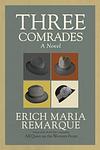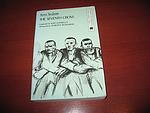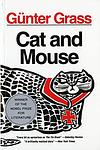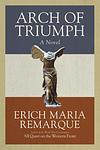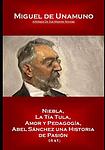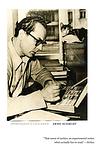The Greatest Polish, German, Spanish "Fiction" Books Since 1900
Click to learn how this list is calculated.
This list represents a comprehensive and trusted collection of the greatest books. Developed through a specialized algorithm, it brings together 305 'best of' book lists to form a definitive guide to the world's most acclaimed books. For those interested in how these books are chosen, additional details can be found on the rankings page.
Genres
Countries
Date Range
Reading Statistics
Click the button below to see how many of these books you've read!
Download
If you're interested in downloading this list as a CSV file for use in a spreadsheet application, you can easily do so by clicking the button below. Please note that to ensure a manageable file size and faster download, the CSV will include details for only the first 500 books.
Download-
26. The Emigrants by Winfried Georg Sebald
"The Emigrants" is a novel that explores the experiences and memories of four different emigrants, each with a unique and complex history. The narrative primarily focuses on the psychological impact of displacement and the haunting nature of the past. The author delves deep into their lives, revealing their struggles with identity, loss, and the persistent influence of their roots. The narrative is interwoven with historical events, photographs, and other documents, creating a rich tapestry that blurs the line between fact and fiction.
The 1230th Greatest Book of All Time -
27. The Hive by Camilo José Cela
"The Hive" is a novel set in post-Civil War Spain, during the harsh years of Madrid's postwar recovery. It provides a gritty and realistic portrayal of the struggles faced by ordinary citizens in a society marked by deprivation and repression. The narrative is non-linear and fragmented, featuring a vast array of characters from various social classes, whose lives intertwine in a depiction of the bleakness and despair of the time. The book was initially banned in Spain due to its critical view of Franco's regime.
The 1264th Greatest Book of All Time -
28. A Legacy by Sybille Bedford
"A Legacy" is a historical novel that captures the social and political turmoil of early 20th century Germany through the eyes of its protagonist. The story follows a young woman who hails from two distinct families, one being a wealthy Jewish family from Berlin and the other, an aristocratic Catholic family from rural Germany. The narrative provides a detailed account of the protagonist's life, her family's eccentricities, and the eventual downfall of her families amidst the backdrop of the First World War and the Weimar Republic.
The 1374th Greatest Book of All Time -
29. The Painted Bird by Jerzy Kosinski
"The Painted Bird" is a dark and harrowing novel set in Eastern Europe during World War II. The story follows a young, unnamed boy of unknown ethnicity who is sent by his parents to live in a remote village for safety. However, he is instead subjected to brutal violence, abuse, and superstition by the superstitious peasants. The book explores themes of survival, human cruelty, and the loss of innocence in the face of war and hatred.
The 1379th Greatest Book of All Time -
30. The German Lesson by Siegfried Lenz
"The German Lesson" is a vivid exploration of the moral and cultural conflicts of World War II, set in a small German village. The story is narrated by a young boy who is tasked by his school teacher with an assignment to write an essay on "The Joys of Duty." As his father, a local police officer, is assigned the duty of preventing a popular local artist from painting, the boy finds himself torn between his father's rigid adherence to duty and his own growing appreciation for art and individual expression. The narrative grapples with themes of duty, obedience, and the power of art, providing a thoughtful examination of life under the Nazi regime.
The 1386th Greatest Book of All Time -
31. Poems of Federico García Lorca by Federico García Lorca
This collection is an anthology of poems by a renowned Spanish poet, which are characterized by their passionate lyricism, vivid imagery, and exploration of love, death, and the Andalusian landscape. The poet's works often incorporate elements of surrealism and are deeply influenced by traditional Spanish music and folklore. The anthology provides a comprehensive overview of his poetic output, showcasing his unique ability to convey complex emotions and experiences through his evocative verse.
The 1398th Greatest Book of All Time -
32. This Way for the Gas, Ladies and Gentlemen by Tadeusz Borowski
This book is a collection of short stories based on the author's experiences as a prisoner in Auschwitz during the Holocaust. Each story provides a harrowing, yet matter-of-fact, account of life in the concentration camp, from the brutal work details to the constant threat of death. The author's stark and unflinching portrayal of the horrors of Auschwitz serves as a powerful testament to the human capacity for survival and resilience in the face of unimaginable cruelty.
The 1473rd Greatest Book of All Time -
33. Solitude by Caterina Albert
"Solitude" is a novel that explores the life and struggles of a young woman living in a rural Catalan village. The protagonist is a strong-willed, independent woman who defies societal norms and expectations, leading to friction with her conservative community. The narrative examines themes of gender, societal pressures, and the struggle for personal freedom, providing a powerful critique of rural life and patriarchal society.
The 1491st Greatest Book of All Time -
34. Platero by Juan Ramón Jiménez
"Platero" is a beautifully written narrative that follows the relationship between a man and his donkey, Platero, in a small town in Andalusia, Spain. The book is filled with poetic and philosophical musings that reflect on the simple and profound aspects of everyday life. Through the interactions between the man and Platero, the author explores themes of friendship, nature, death, and the passing of time.
The 1491st Greatest Book of All Time -
35. A Heart So White by Javier Marías
The novel delves into the complexities of relationships, secrets, and communication as the protagonist, a translator and interpreter, grapples with the mysterious suicide of his father's first wife and the pervasive silence surrounding it. Through his own marriage and his observations of others', he contemplates the unsaid and the power of words, both spoken and unspoken. The narrative weaves through time and memory, exploring the impact of the past on the present and the intricate ways in which people understand and misunderstand each other.
The 1529th Greatest Book of All Time -
36. The Time Of The Doves by Merce Rodoreda
The novel is a poignant exploration of a woman's life set against the backdrop of the Spanish Civil War and the early years of Franco's dictatorship. Through the eyes of the protagonist, a shopkeeper in Barcelona, readers experience her struggles with love, loss, and survival. Her personal journey is interwoven with the turbulent history of the era, as she endures the hardships of war, the complexities of her romantic relationships, and the challenges of raising her children alone. The narrative, rich with symbolic imagery, particularly the recurring motif of doves, offers a deeply emotional and intimate portrayal of resilience amidst the chaos of societal upheaval.
The 1600th Greatest Book of All Time -
37. Demian by Hermann Hesse
The novel follows the life of a young man, Emil Sinclair, from childhood to adulthood, as he navigates the duality of his nature and the societal expectations of his time. He is influenced by a charismatic and intellectual peer, Max Demian, who introduces him to the concept of the world not as a dichotomy of good and evil, but as a unified whole. This leads Sinclair on a journey of self-discovery and spiritual enlightenment, exploring themes of identity, morality, and the subconscious. The narrative is heavily influenced by the philosophies of Carl Jung and the Gnostic tradition.
The 1644th Greatest Book of All Time -
38. Three Comrades by Erich Maria Remarque
Set in the interwar period in Germany, the novel revolves around the deep bond of friendship between three World War I veterans struggling to adapt to civilian life amidst the economic and social turmoil of Weimar Republic. The trio copes with their trauma and disillusionment by sticking together and seeking solace in their shared experiences. Their camaraderie is further enriched and complicated by the arrival of a beautiful, spirited woman, who becomes intimately entwined with their lives. As they navigate the challenges of love, loss, and the scars of war, the story poignantly captures the fragility of hope and the enduring spirit of friendship against the backdrop of a society on the brink of monumental change.
The 1662nd Greatest Book of All Time -
39. Jacob the Liar by Jurek Becker
Set during the Holocaust in a Jewish ghetto in Poland, the novel revolves around a man named Jacob who fabricates the news of the Russian Army's advancement to uplift the spirits of his fellow prisoners. However, as his lies gain traction, they become a beacon of hope for the desperate people in the ghetto, leading to unforeseen consequences. The book explores themes of hope, despair, and the power of words, ultimately questioning the morality of lying for a greater good.
The 1667th Greatest Book of All Time -
40. Narcissus And Goldmund by Hermann Hesse
The novel explores the complex friendship between two diametrically opposed characters: one, a cerebral and ascetic monk dedicated to a life of contemplation and spiritual discipline, and the other, a passionate and sensual artist driven by the pursuit of beauty and worldly experiences. Set against the backdrop of medieval Europe, the story delves into themes of duality, the search for meaning, and the reconciliation of the spiritual with the carnal. As the two men journey through their lives, their intertwined paths lead them to profound insights about the nature of human existence, creativity, and the eternal struggle between the intellect and the senses.
The 1679th Greatest Book of All Time -
41. The Magician of Lublin by Isaac Bashevis Singer
This novel tells the story of Yasha Mazur, a talented and renowned 19th-century Jewish magician living in Poland. Yasha is a complex character, torn between his own desires and the expectations of his religious community. He leads a double life, juggling his career, his marriage, and his multiple affairs. As he grapples with his conflicting identities, Yasha is forced to confront his own moral failings and the consequences of his actions. His journey is one of self-discovery and redemption, offering a nuanced exploration of faith, love, and the human condition.
The 1720th Greatest Book of All Time -
42. Professor Unrat by Heinrich Mann
The novel is a social critique of bourgeois society in Germany during the Wilhelmine period, as seen through the life of an authoritarian and morally rigid school teacher. The protagonist becomes infatuated with a cabaret dancer, leading him to abandon his duties and societal norms, and eventually descend into madness. The book explores themes of obsession, social class, and the destructive power of repressed desire.
The 1725th Greatest Book of All Time -
43. Mother Courage and Her Children by Bertolt Brecht
Set against the backdrop of the Thirty Years' War, the book tells the story of a canteen woman, Mother Courage, who pulls her cart with her three children across war-torn Europe. It explores her struggles and survival tactics as she tries to profit from the war while keeping her children safe. The narrative is a profound critique of war and its consequences, highlighting the human cost of conflict and the often futile search for prosperity and security in a chaotic world.
The 1735th Greatest Book of All Time -
44. The Resistible Rise of Arturo Ui by Bertolt Brecht
"The Resistible Rise of Arturo Ui" is a satirical play that uses the rise of a fictional 1930s Chicago mobster, Arturo Ui, to parallel the rise of Adolf Hitler in Nazi Germany. The narrative is a critique of those who allowed Hitler to come to power, emphasizing that his rise was indeed resistible. The play explores themes of power, corruption, manipulation, and the dangers of complacency, showcasing the destructive potential of unchecked ambition and the failure of society to prevent the ascent of dangerous individuals.
The 1739th Greatest Book of All Time -
45. The Seventh Cross by Anna Seghers
"The Seventh Cross" is a gripping tale set in Nazi Germany that revolves around seven men who escape from a concentration camp. The camp commandant erects seven crosses, vowing to hang each escapee on their return. The story primarily follows one escapee, who manages to evade capture and make his way back to his hometown. The narrative explores the psychological terror imposed by the Nazi regime, the resilience of human spirit, and the subtle forms of resistance within the German populace.
The 1751st Greatest Book of All Time -
46. Cat and Mouse by Günter Grass
"Cat and Mouse" is a novel that centers around a group of boys living in Danzig during World War II. The story is narrated by one of the boys, who recounts the life of his friend, whom they call "the great Mahlke", a boy with a large Adam's apple. Mahlke's attempts to prove himself a hero despite his physical oddity, his obsession with a sunken ship, and his eventual expulsion from school and enlistment in the war form the heart of the narrative. The novel explores themes of identity, guilt, memory, and the devastating impact of war on the individual and society.
The 1776th Greatest Book of All Time -
47. Arch Of Triumph by Erich Maria Remarque
Set against the backdrop of the looming Second World War in Paris, the narrative follows a German refugee and surgeon who is living without proper documents after escaping from Nazi Germany. Haunted by his past and the horrors he has witnessed, he navigates the dark streets of Paris, performing surgeries in a clandestine practice for other displaced immigrants. Amidst his struggle for survival and identity, he engages in a passionate but tumultuous love affair with an Italian woman, which brings temporary solace but ultimately leads to greater despair. The story is a poignant exploration of exile, loss, and the human desire for connection and meaning in the face of relentless adversity.
The 1850th Greatest Book of All Time -
48. The Egghead Republic by Arno Schmidt
The book is a satirical science fiction novella that takes readers on a journey through a post-apocalyptic world. Set in a future where a catastrophic event has fragmented society, the story follows a journalist as he travels to an artificial island known as the Egghead Republic, a haven for intellectuals and scientists. This enclave is dedicated to preserving knowledge and culture amidst the chaos of the outside world. The narrative is characterized by its linguistic inventiveness and complex wordplay, as it explores themes of isolation, the role of intellectuals in society, and the nature of human civilization through the lens of a dystopian future.
The 1873rd Greatest Book of All Time -
49. Abel Sánchez by Miguel de Unamuno
The book is a profound exploration of envy and its corrosive effects on the human soul, told through the lifelong rivalry between two friends. The protagonist, whose artistic ambitions and personal happiness are overshadowed by his obsessive jealousy of his friend's success and innate talent, descends into a destructive spiral of resentment. This dark passion not only poisons his own life but also impacts those around him, leading to tragic consequences. The narrative delves deep into the psychological complexities of its characters, offering a timeless meditation on the nature of envy and the human condition.
The 1875th Greatest Book of All Time -
50. Scenes From The Life Of A Faun by Arno Schmidt
"Scenes from the Life of a Faun" is a complex and experimental novel that delves into the psyche of a German civil servant living in the aftermath of World War II. The protagonist, burdened by the guilt and trauma of the war, retreats into a fantasy world where he imagines himself as a mythological faun. Through a fragmented narrative structure and a dense web of literary and historical references, the book explores themes of memory, responsibility, and the struggle to find meaning in a shattered world. The protagonist's internal journey is a reflection on the moral ambiguities of his time, as he grapples with his complicity in the horrors of the past while seeking redemption in his personal mythology.
The 1878th Greatest Book of All Time
Reading Statistics
Click the button below to see how many of these books you've read!
Download
If you're interested in downloading this list as a CSV file for use in a spreadsheet application, you can easily do so by clicking the button below. Please note that to ensure a manageable file size and faster download, the CSV will include details for only the first 500 books.
Download











